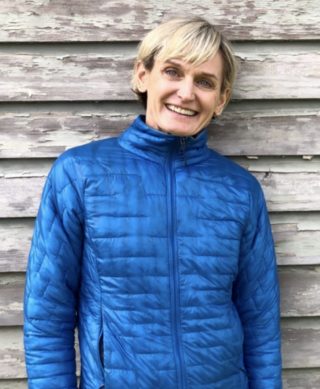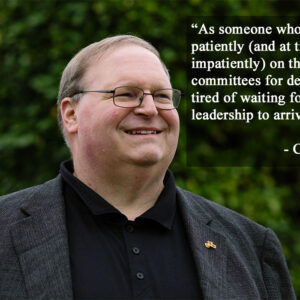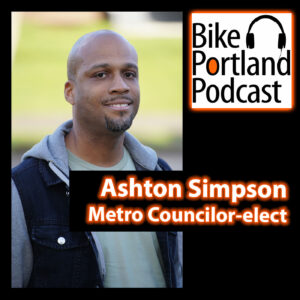
(Photo: Peveto for Metro)
It’s hard to know what the future holds, but we’re operating under the assumption that we’ll still have local elections on May 19th.
One of the hottest races in town is for a seat on Metro Council. District 5 is up for grabs because Councilor Sam Chase (who’s held the seat since 2013) is running for Portland City Council. In the past month or so we’ve shared posts from two other candidates in this race: Portland Planning Commissioner and transportation reform activist Chris Smith, and civic and nonprofit leader Cameron Whitten.
Today we’ll hear from Mary Peveto. She answered five of my questions.
First, some background. Peveto is known for her work in air quality activism. She founded and still leads Neighbors for Clean Air, a nonprofit that forced a big steel company in northwest Portland to install air cleaning equipment at their plant. Her group has also successfully lobbied the legislature to reduce diesel pollution. Peveto told me she has experience not only in going after big corporations, “But also ineffective and sometimes intransigent government agencies to hold them accountable for doing their jobs of protecting people.”
“I am a bike commuter. You are more likely to see me biking in heels and a skirt than spandex. It is my first choice in transportation options for working around the city”
Peveto also shared the key to her success has been building large, diverse coalitions. “This is critical to why I believe I am the strongest candidate in this race,” she said. “I have not just fought against things, I have fought for things.”
When it comes to endorsements, Peveto boasts an impressive list that includes: Bicycle Transportation Alliance (now The Street Trust) co-founder and former Metro Councilor Rex Burkholder; Dr. Vivek Shandas, Professor of Climate Adaptation, Portland State University; Oregon League of Conservation Voters; and others.
Here’s how she answered my questions:
What’s your relationship to cycling?
I am a bike commuter. You are more likely to see me biking in heels and a skirt than spandex. It is my first choice in transportation options for working around the city, though if it is raining hard, I prefer walking. After having had two street bikes stolen, I gave up ownership, and am now a very active Biketown user.
Many BikePortland readers are relatively familiar with Chris Smith given his years of activism on transportation issues. What can you share about your experience with transportation policy/projects and/or how your previous experience might inform your stance on it?
My work has intersected on transportation policy issues since 2014 when the organization I have led, Neighbors for Clean Air, became focused on reducing diesel particulate emissions. But my most significant understanding of regional transportation concerns and policy was through serving as Chair (2014-2018) of Multnomah County’s Advisory Committee on Sustainability and Innovation (ACSI). Transportation in the region, heavily laden with freight movement and diesel particulate matter (pm) emissions, is the single biggest contributor to greenhouse gas emissions and the most deadly air contaminants. While NCA was directly advocating for stronger standards on diesel engines in Oregon, I was deeply engaged in making policy recommendations to the Multnomah County Board in regards to the Climate Action Plan. The 2017 Climate Action Plan Updates included significant details to address the fact that transportation of goods and people accounts for nearly 40 percent of Multnomah County carbon emissions. The only way to achieve the 2050 goal of reducing local carbon emissions by 80 percent below 1990 levels, significant transportation-related reductions must be achieved through coordinated land use policies and the development of infrastructure for low-carbon transportation. This was a particularly useful lens to understand regional transportation needs, since county assessments could better see the inequities. The plan outlined 38 recommendations to create neighborhoods where 80 percent of Portland and Multnomah County residents can easily walk or bike to meet all basic daily, non-work needs and have safe pedestrian or bicycle access to transit, as well as to move freight more efficiently through the region.
What should be the top regional transportation priority and how would you create urgency around it?
“Metro should consider taking over Trimet. Having an unelected board of political appointees in charge of the most critical component of public infrastructure leads to a staff driven rather than user driven system.”
There are so many things that strong transportation policy intersects with, but my driving passion and priority is the climate and improved air quality. To achieve carbon-reduction goals, we need to reduce daily vehicle miles of travel per person in the region, which is going to require the percent of commute trips by walking, biking, and transit to likely need to more than double by 2030.
This means ensuring that Trimet is creating a world class regional transportation that offers commuters a real choice and alternative to driving. Safety, security, frequency, and convenience should be the driving factors of transit investments and the roads buses run on. Bus only lanes, safe crossings, well-lit bus stops, and ensuring all investments have significant returns on ridership increases, etc, would make transit the smart choice for all travelers.
Metro should taking over Trimet. Having an unelected board of political appointees in charge of the most critical component of public infrastructure leads to a staff driven rather than user driven system.
Advertisement
Do you think Metro has found the right mix of projects in the 2020 transportation investment measure?
“The real problem is driving.”
Not on the climate and air quality. This is a crucial opportunity and a significant impetus for why I am running for Metro Council. Transportation is the single biggest contributor to greenhouse gas emissions and air pollution in the region. Metro’s charter has consistently contained a clear mandate to protect air quality, the environment, and the livability of neighborhoods. Yet, decades of neglect of our transportation infrastructure, with the exception of continually expanding highway capacity, has entrapped most people in their cars and has resulted in increases in greenhouse gas (GHG) and air pollution.
Greenhouse gas emissions are growing in the Portland region and will get much worse. With the “emergency declarations” of Governor Kate Brown and Mayor Ted Wheeler, you would think there are actual plans to fight against climate change. Nothing could be further from the truth.
The real problem is driving. Transportation-related emissions are up 6% for 2019, and 14% over the last five years. Gasoline vehicles are the largest source of carbon emissions in the region. Driving increases overall carbon emissions every year here.
We need to anticipate population growth adding to driving. Over the next 20 years, the four-county region, including Clark County, is projected to gain 561,000 people. If transit stalls at its current share of 4.2% of trips and cycling at 0.7%, new car and truck trips in the region will total three million more daily trips by 2040, according to Metro’s formula.
This bond measure takes strong steps to increase safety and choice, but more must be done. The measure fails to reduce carbon emissions with its current mix of projects, and just like in previous iterations of, there is no way to measure its efficacy on reducing either carbon or other harmful emissions related to transportation activity. Fully funding the Youth Pass program, completing bicycle networks, reallocating street space to non-car uses like bike lanes, sidewalks and bus-only lanes, as well as policy changes, including a shift from expensive freeway expansion to full tolling of the regional freeways should be priorities of this measure. The measure should also include establishing a robust air monitoring network. By tracking greenhouse gas emissions and air pollution at a finer grain scale, we can enhance existing data and clearly enumerate the contribution of transportation and avoid disproportionate impacts and inequities.
Do you think the SW Corridor project deserves the investment it’s slated to receive? Or are there other things we should fund instead of that?
“I am really concerned about the cost of the SW Corridor project… it will bring only 7,000 new commuters a day (both ways) into the transit system.”
I am really concerned about the cost of the SW Corridor project, especially considering that two of the last big expansions in the last decade, the Orange line to Milwaukie and the Green line to Clackamas Town Center, did not increase system ridership, and I don’t believe we can afford any transit investments that don’t increase the use of public transportation options. Again, to meet our dual goals of congestion reduction and greenhouse gas reductions, we need to offer people strong choices to not use their cars. Thus, any Trimet investment should be held to a metric on how it will increase ridership. The current estimated cost of $2.8 billion for the SW Corridor project, with $950,000,000 coming from the Metro measure, is disproportionate to its contribution to congestion reduction and climate goals. This is easily seen by looking at the analysis: it will serve 37,000 daily trips, at least 23,000 of which are currently served by TriMet buses. This means that it will bring only 7,000 new commuters a day (both ways) into the transit system. The two main sources of transit traffic in that stretch are OHSU and Portland Community College, so I don’t understand why it isn’t being designed to directly serve commuters to and from these locations.
Learn more at PevetoforMetro.com. You can see all our 2020 election coverage here.
— Jonathan Maus: (503) 706-8804, @jonathan_maus on Twitter and jonathan@bikeportland.org
— Get our headlines delivered to your inbox.
— Support this independent community media outlet with a one-time contribution or monthly subscription.





The idea of having TriMet governed by elected officials is right on.
Unfortunate that both Chris and Mary are running for the same seat.
“The real problem is driving.” No it’s not. It’s having a public transit system that is barely usable at best for many people. Include bike infrastructure that serves mainly those in the inner city. The real problem also includes basically no representation for many in this city with an elitist city council who could give a sh*t less about those unrepresented parts of the city, despite their tired talking points.
Interesting how in other posts you harp on about “vindictive lane removals” (removing lanes is meant to improve bike infrastructure) and cut through traffic (a by product of impatience and entitlement). However, in this one you point out that you think driving isn’t the problem and that bike and transportation infrastructure is inadequate. Which one is it Toby? What would you do to solve these issues?
Ok are you digitally stalking me or something? Yes I stand by what I said. The heavy handed and poorly implemented infrastructure in parts of east Portland has done nothing to encourage bike ridership, or ease congestion. Lane reductions that have created huge backups that did not exist prior to the changes certainly doesn’t indicate good planning and design does it?
Nope, just a country music fan that also lives out in here in East portland. I remembered your previous comments because of the connection. I think it’s important to recognize that great infrastructure will not happen overnight and it definitely didn’t in the inner part of the city. However, the inner city had the luxury of getting a lot of infrastructure attention years before congestion was even a problem in Portland. It’s going to be a really painful process getting the improvement we desperately need out here and it makes sense that people like yourself feel victimized by the changes. However, it’s the honest to god truth that single occupancy vehicles are not the future. I can’t deny it and neither can you without lying to yourself. People are starting to pay attention to how dangerous it is out here especially as former inner city dwellers get pushed further to follow the cheaper housing costs. This means changes are coming and are going to get more painful in terms of congestion, but I’d be willing to bet it will be a worthwhile inconvenience in the long term.
The problem isn’t that good infrastructure isn’t happening over night, it just isn’t happening. Portland wants to punish folks for driving before they’ve built an alternative for them to go to. PBOT loves the idea of tolling and getting more of the city under parking meters, but the reality is that folks who live on the peninsula, folks who live east of 82nd and folks who live in deep SW do not have an alternative to driving. And PBOT aint building one.
PBOT acts like installing speed bumps is some major lift. Adding sharrows can earn the a street the dubious honor of “greenway”! Not even suburbs pretend that sharrows and speed bumps are special.
N Willamette St in my part of town, a street that could have been a major bike and ped arterial was just redone. Sharrows and speed bumps. Stop signs at almost all intersections. It’s not that PBOT can’t do things fast enough, its that they don’t do the right thing.
Our bike mode share will only continue to fall because PBOT still focuses on moving motorist as fast as possible through the city and making sure there is tons of publicly subsidized parking when they get there.
Please vote, not matter whom you select.
I suggest cyclists vote for Chris Smith or Cameron Whitten. I gave 50 to Cameron.
here are a few reasons to back up my views:
I met Mary in 2013 when I moved near the Dailmer plant. I would often breathe in the heavy fumes clearly from them ( only VOC was on those few blocks)
Mary shot my idea down in a clean air meeting. It was the first time we met., and another neighbor came over and said that Mary treated her with contempt in the same way on the same topic. Mary did not even live in this pollution hot spot. I made the error of using one minor bit of profanity and Mary got very offended and treated me with contempt ever since.
My radical idea that Mary rejectged? I suggested a fence monitor cluster surrounding the plant as a good idea.
I don’t trust Mary: White, smart, well off financially, well connected to insiders in power,
Mary is endorsed by: Rex Burkholder. He Fastracked the CRC freeway. What a perfect match of Mary, Rex and the BTA. The BTA rebranded itself and now it says… wait for it… the Moda Freeways has “much needed” caps.
FYI. Rex… Rex in 2011 abused his elected seat at Metro to fast track a freeway with a 1986 LUFO law. LUFO helped us build the airport max. LUFO was not passed to improve the CRC freeway, but it got twisted into that. This is a story Jonathan would never publish FYI.
Use your vote and donations with care. Want the most clean air for your dollar. Buy a sensor. 2 years ago I purchased a purple air outdoor air sensor for my home, and it’s part of this pollution map , much like a google map
https://www.purpleair.com/map?opt=1/mAQI/a10/cC0#11.52/45.5513/-122.6663
https://www.oregonmetro.gov/columbia-river-crossing-land-use-final-order
https://web.archive.org/web/20181220164328/https://www.thestreettrust.org/2017/08/the-future-of-the-rose-quarter/